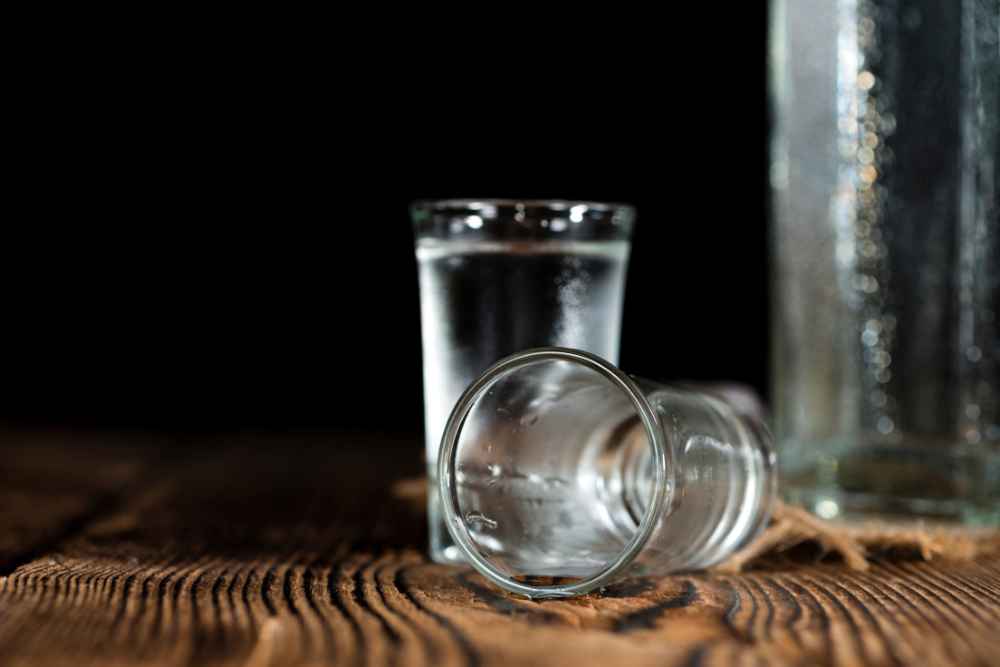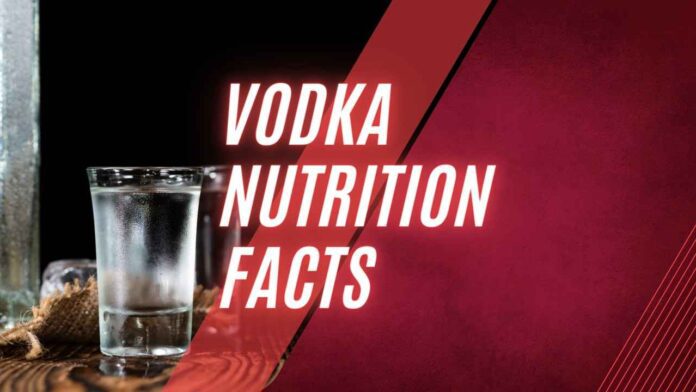This page may contain affiliate links. Please see our Disclaimer for more information. Always drink responsibly and adhere to your local legal drinking age.
Regarding your weekend drinks, you might want to go beyond the taste and think about the nutritional facts, too! We know you already care about what goes into your glass—just like what goes onto your plate. That’s why we’re here to provide the all-important information on nutrition facts on vodka.
Forget what you heard: Vodka doesn’t have to be a dieting no-no. It contains carbs and calories if you’re imbibing and eating regular meals. But as long as you monitor how much vodka you’re having, there’s no reason it can’t fit into a balanced lifestyle.
This article will overview vodka nutrition facts: calories, carbs, and more. We promise that by the end of this read, your understanding of booze will have increased significantly!
Vodka Nutrition Facts
Ah, vodka—it is a staple at the bar or any liquor store, but how does it measure up regarding your nutrition? Spoiler alert: not so well. Vodka is a clear, distilled alcoholic beverage made from grain or potatoes. While it’s not particularly high in calories compared to other alcoholic beverages, it does contain some pretty eye-opening vodka nutrition facts.
Let’s start with the basics: vodka contains zero carbs and zero fat. That makes it one of the most calorie-friendly options for alcoholic drinks. But don’t be fooled by its low-calorie profile—at 40 percent alcohol content, vodka packs quite a punch in terms of health risks and calories per serving.
According to the United States Department of Agriculture (USDA), vodka has 64 calories per ounce and 97 calories per shot (1.5 ounces), so keep an eye on your serving size if you watch your waistline. And while alcohol isn’t technically a “nutrient,” you should be aware that each gram of ethanol (the type of alcohol found in vodka) contains seven calories of energy.
How is Vodka Made?

If you’re wondering how vodka is made, the process is actually quite simple. Vodka ferments starchy or sugary plant materials like wheat, rye, barley, or potatoes. After fermentation, the mixture goes through a distillation process and is purified for clarity and flavor before being bottled.
After the fermentation and distillation process of the vodka, the carbohydrates from the plants used to create it are removed. One ounce of 80-proof vodka generally contains about 64 calories and 0 grams of carbohydrates.
The carb content in vodka can vary between brands, but for the most part, one 1.5-ounce shot of standard 80-proof vodka will contain zero grams, but some can contain about one gram of carbs, making it the ideal low-carb drink option for those looking to keep their calorie and carb intake in check!
Different Types of Vodka
Regarding vodka nutrition facts, it’s important to know that different types can affect calories, carbs, and other nutritional components.
Plain Vodka
As you may have guessed, pure vodka has no flavor and can be made from grains or potatoes. The calories in standard 80-proof (40% ABV) vodka are around 97 per shot (1.5 ounces), while the carbs are typically around 0 grams.
Plain vodka generally contains fewer calories than flavored. However, this amount can vary depending on the brand, proof, and production of vodka.
Flavored Vodka
Flavored vodkas come in various flavors, including berry, citrus, and even bacon! The actual number of calories in flavor-infused vodka depends on the flavor; for example, a 1.5-ounce raspberry-flavored vodka contains about 105 calories, while a vanilla-flavored vodka contains about 115 calories. The carb content generally varies between 0 and 3 grams per serving for flavored vodkas.
It is best to check the nutrition information on the label for the actual number of calories in vodka.
Vodka Sodas
Mixtures of ready-to-drink flavored vodkas and zero-calorie sodas have become increasingly popular in recent years. Typically, these mixtures contain between 90–150 calories per serving (12 ounces). Again, their carbs content varies by brand; some contain as few as 2 grams per serving while others can have up to 10 grams or more.
Calories in Vodka
Whether you’re counting calories in your adult beverage or just curious, you might be surprised to learn that vodka has no significant nutritional value. A standard (1.5 oz) serving of vodka has 96 calories and 0 grams of carbohydrates—that’s it!
No sugars, no fats, no proteins—just pure alcohol. So if you want to ensure your cocktails don’t go too high on the calorie scale, then vodka is a great option.
Here are some other common liquid* measurements and their associated calorie count:
- Shots: 1 oz (30ml) = 64 calories
- Single mixed drink: 2.9 oz (87ml) = 128 calories
- Double mixed drink: 5.7 oz (170ml) = 256 calories
So if you’re trying to watch your calorie intake—or any other nutritional factors—it pays to know what’s in your glass before you sip it down.
*For reference only. Alcoholic beverages may contain other ingredients that add additional calories and other nutritional components such as sugars and fats.
Carbs in Vodka vs Other Spirits
You may be surprised that vodka has fewer carbs than other distilled spirits. For example, gin and whiskey both contain more carbs than vodka. A shot of vodka (1.5 ounces) contains zero carbs, a shot of gin contains 0 grams of carbohydrates, and a shot of whiskey contains 0 grams of carbohydrates. This means that vodka and other distilled spirits generally have no carbs.
But take note: if you’re drinking cocktails made with syrups or added sugars, the carb count can quickly skyrocket — with or without alcohol! So read labels carefully or ask your bartender for information on what’s in your cocktail before ordering it.
How Many Calories and Carbs in a Shot of Vodka?

You might be wondering about the nutrition facts for vodka. A 1.5-oz shot of vodka has about 97 calories and zero carbs. That’s significantly fewer calories than a 12-ounce can of beer and no carbs at all—so if you’re watching your carb intake, vodka’s got you covered.
But of course, there’s more to it than calories and carbs when it comes to nutrition facts for alcohol. Here’s a closer look:
Calories
A 1.5-oz shot of vodka has 97 calories—but the amount can vary depending on the brand, proof (alcohol content), and serving size. For example, suppose you have a 4-oz Vodka Martini with vermouth. In that case, the calorie count increases to 162 per 4 ounces because vermouth is made from fortified wine and contains various amounts of sugar, depending on the type.
Carbs
There are no carbs in vodka as it is distilled from grains and potatoes that are fermented with yeast before being distilled so that all the sugar molecules are broken down into alcohol molecules. However, if you add sugar-based mixers like syrup or juice, the number of carbs can vary significantly depending on the brand and type of mixer you choose.
Health Benefits of Low-Calorie Vodka Recipes
Did you know that consuming vodka in certain cocktails can benefit your health? Low-calorie vodka cocktails bring plenty of health benefits that you may not know about.
Low-calorie Options
You can enjoy a healthy and low-calorie cocktail by turning to low-carb vodka and light mixers. For example, use club soda or tonic water with added lime juice instead of regular soda for a delicious low-carb concoction. This way, your drink will be significantly lower in sugar and carbs than those made with sugary sodas and mixers.
Antioxidant Boost
Surprisingly, you can pump up the antioxidant content of your favorite vodka recipes by adding fresh fruits or vegetables! Fruits such as oranges, apples, and berries are packed with beneficial nutrients that can round out your drink while adding a bump of antioxidants. And don’t forget about vegetables like celery, cucumber, or bell peppers—they are also loaded with vitamins and minerals!
Stress Relief
Research has found that moderate alcohol consumption can help reduce stress levels. Vodka contains compounds known as ‘phenols,’ which act on specific receptors in the brain related to relaxation and stress relief. While overconsumption of any amount of alcohol is not recommended, enjoying a low-calorie vodka cocktail helps you kick back at the end of a long day without packing on calories or carbs.
Vodka and Weight Loss
You might wonder if vodka is good for your weight loss journey. Well, the truth is that vodka can definitely be part of a healthy diet plan if consumed in moderation.
Low in Calories and Fat
One of the main points to focus on is that vodka contains no fat and only has about 97 calories per 1.5-ounce shot—less than beer, wine, or even some mixers like soda or juice. So why not choose this as your go-to option instead?
Low Carb Option
Vodka also contains no carbs, so it’s a great alternative if you want something without sugar and carbs. Many people on low-carb diets opt for vodka over other high-carb drinks like beer.
Plus, if you’re avoiding sugar, vodka has the lowest sugar compared to other alcoholic beverages when served neat (without a mixer). So this makes it an ideal option for those who want to reduce their daily sugar intake.
The bottom line is while vodka can be a good option for cutting calories and carbs from your diet, it’s important to remember to consume it responsibly and in moderation.
Simple Vodka Cocktails

Is Vodka Gluten Free?
Now, let’s get to one of the most common questions regarding vodka nutrition facts—is vodka gluten-free? The answer is: not necessary.
While some vodka producers distill their products using grains like corn or potatoes that do not contain gluten, many others opt for wheat, barley, or rye—all of which contain gluten. Check the label or contact the manufacturer to determine whether vodka contains gluten.
Traditional vodka and pure distilled liquors generally are gluten-free. This is because the vodka production process and distillation remove the base ingredients and leave only the alcohol. Be wary of cheap brands in the vodka industry because their rushed process can contain trace amounts of gluten.
Several brands meet this requirement for those needing a 100% gluten-free product. Absolut Vodka, for example, is made with natural ingredients, including winter wheat, and is distilled multiple times—and it is completely gluten-free. So if you’re looking for a great option while considering your dietary needs, this may be the way to go.
Tips to Reduce Alcohol Consumption
You may already know that vodka has almost zero carbs and zero sugar, but did you know there are ways to cut back on your intake of alcohol? Here are some useful tips that can help you enjoy a night out without over-indulging:
- Mix drinks with low-calorie mixers such as club soda or diet tonic, as these will decrease your total calorie count.
- Try opting for vodka on the rocks! Avoiding sugary mixers eliminates extra calories, and not using a shaker helps keep things light.
- Sip slowly. Taking your time with each drink allows you to savor its taste while also making it easier to track how much you’re drinking.
- Alternate between alcoholic and nonalcoholic beverages throughout the night, allowing for more hydration and fewer calories per hour consumed.
- Enjoy vodka in moderation by setting a limit for yourself before heading out for the night; this will also help prevent any potential health issues later down the line and help reduce any additional costs associated with overindulging in alcohol-based beverages.
Number of Calories in Flavored Vodka
You probably know that a shot of vodka has about 97 calories. But did you know that flavored vodka, like cherry or raspberry, can have more? That’s because flavored vodka usually contains extra ingredients like sugar and artificial sweeteners that add more calories.
It also adds more carbs. A shot of regular vodka contains just 0g of carbohydrates, but a shot of flavored vodka could be anywhere from 1g to 4g, depending on the flavor.
So while flavored vodka might taste great, it can really bump up your calorie and carb count! It’s something to be aware of if you’re watching what you eat or drink. As always, moderation is key when drinking any alcohol—especially when it comes to higher-calorie drinks like flavored vodka.
Calories in Different Brands of Vodka
When it comes to calories, the amount of calories in a standard shot of vodka varies from product to product. A one-ounce shot (30ml) of most vodka brands will contain around 97 calories, but some lower-proof brands can contain up to 100 calories.
So if you want to keep your calorie intake low, here’s a breakdown of the calories per shot for some popular vodka brands:
- Smirnoff – 96 calories
- Grey Goose – 96 calories
- Belvedere – 97 calories
- UV – 100 calories
- Skyy – 96 calories
- Tito’s Handmade Vodka – 98 calories
- Ketel One Vodka – 96 calories
- Absolut Vodka – 96 calories
So while there are plenty of high-calorie options, if you’re concerned about the number of nutrition facts in vodka, you should focus on lower-proof brands. The higher the proof (i.e., alcohol content), the more likely it is to have more calories in each ounce/shot.
Vodka Compared to Other Types of Alcohol
Let’s say you’re wondering how vodka compares to other types of alcohol regarding calories and carbs. Well, here’s what you need to know. While all types of alcohol contain some calories and carbs, the amounts vary depending on the type of alcohol—so let’s compare vodka with a few different varieties.
Wine vs. Vodka
Wine, typically having anywhere from 1-4 grams of carbs per 5oz serving, packs a higher amount than vodka—which typically has just 0-1 gram per 1.5oz serving. Regarding calories, wine tends to have around 125-150 per 5oz serving, while vodka has roughly 100 per 1.5oz serving.
Beer vs Vodka
The same goes for beer versus vodka—beer typically has 11-15 grams of carbs and 150 calories in a 12-ounce bottle, while vodka has 0-1 gram of carbs and around 100 calories in a 1.5oz shot or glassful. So if you’re watching your carb and calorie intake, beer may be higher in those categories than vodka.
Now it’s time to decide on the adult beverage that works for you!
Is Vodka Bad For You?
So you know all the nutrition facts of vodka, but is it bad for you? Ultimately, it depends on how much you drink. If you’re going to have vodka, it’s best to enjoy it responsibly and not overdo it.
It’s important to know that vodka does have some health benefits. For instance, drinking in moderation can help reduce your heart disease and stroke risk. The antioxidants in vodka can also help protect against cancer and boost the immune system.
Moreover, vodka contains no fat or carbohydrates and has fewer calories than other alcoholic drinks. Drinking heavily will still increase your risk of high blood pressure and other medical issues—so always drink responsibly!
So to answer the question: is vodka bad for you? It really depends on how much you drink and how responsible you are about your consumption. Drinking in moderation can benefit your health, but don’t forget that hard alcohol should be enjoyed responsibly! If you are worried about your health, it is best not to drink alcohol.
Best Healthy Mixers
Now that you know the nutrition facts of vodka, including calories and carbs, you might be interested in the healthiest mixers for your vodka cocktails. After all, what’s a Bloody Mary without tomato juice? Or a Screwdriver without orange juice?
The good news is that there are plenty of healthy mixers out there. Here are some of the best options:
- Fresh-squeezed citrus juices – Lemon and lime juice are both good options. Not only do they add flavor to your drink, but they also provide you with some Vitamin C!
- Spicy cocktail mixes – Some pre-made cocktail mixes contain spices that can help boost your metabolisms, like ginger and cayenne pepper. This is a great option if you’re looking for a flavorful way to keep your drink low in calories.
- Low-calorie soda – You don’t have to give up soda completely when making vodka drinks if you opt for one of the lighter versions. Try sparkling or tonic water with a splash of fruit juice for a flavorful yet low-calorie mixer!
FAQ
You probably have questions about nutrition facts about vodka, and you’re not alone. Here are some of the people’s most common questions regarding vodka nutrition.
Is Vodka Gluten-Free?
Yes, it is! All vodkas are gluten-free, so if you have Celiac Disease or gluten sensitivity, you don’t need to worry about drinking vodka. However, many flavored vodkas could contain gluten because of the added ingredients after distillation.
What Are the Calories in Vodka?
Vodka contains about 97 calories per ounce, which is relatively low compared to other alcoholic beverages. Remember, that mixer like juice or soda will add calories to your drink.
How Many Carbs Does Vodka Have?
Vodka is virtually carb-free, with each ounce containing 0g of carbs. However, if you’re drinking flavored vodka or cocktails with mixers like soda and juice, those will have carbs in them.
Conclusion
In conclusion, vodka is a low-calorie and carbohydrate drink if enjoyed in moderation. The calories and carbs associated with vodka can add up quickly, so it’s important to be mindful of how much you’re drinking.
As with any alcoholic beverage, you should drink responsibly and not overindulge. The caloric and carb content of vodka will vary depending on what you’re drinking—whether it’s a martini, a shot, or a straight pour.
So if you’re looking for a lightly alcoholic beverage, vodka can be a great choice—just be sure to keep your servings light and enjoy it in moderation. With the right plan, you can enjoy a vodka-based drink without going overboard on your caloric or carb intake.



















